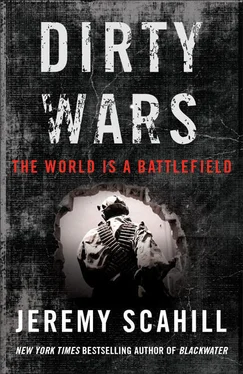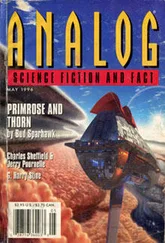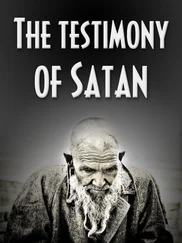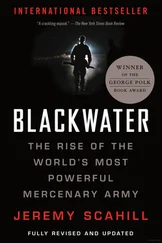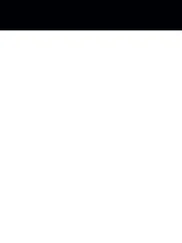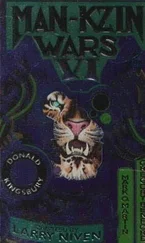The author of the report was Richard Shultz, an academic who specialized in Special Operations warfare, and its purpose was to dissect Clinton’s counterterrorism strategy. Rumsfeld wanted to ensure that any legal or bureaucratic barriers to unleashing JSOC would be smashed. Shultz was given a security clearance and free rein to conduct interviews with senior military officials and to review intelligence. The ultimate conclusion of the Shultz report was that the United States needed to take JSOC off the national security shelf and put it front and center in the war on terror.
The Shultz report, parts of which were later adapted into an unclassified article for the neoconservative Weekly Standard , also postulated that the Black Hawk Down incident in 1993 in Somalia had scared the White House into paralyzing Special Operations Forces. In late 1992, the United States was leading a UN peacekeeping mission aimed at delivering aid and, later, ridding Somalia of the warlords who had overthrown the country’s government. But the warlords openly defied the US and UN forces and continued to pillage Somalia. In the summer of 1993, after a series of attacks on UN forces, Clinton gave the green light to JSOC to conduct a daring operation to take down the inner circle of the notorious warlord Mohamed Farrah Aidid, whose forces were rapidly consolidating their control of Mogadishu. But the mission descended into disaster when two of JSOC’s Black Hawk helicopters were shot down over Mogadishu, sparking a massive battle between Special Ops Forces and Somali militia members. In all, eighteen US soldiers were killed. Images of some of the Americans being dragged through the streets were broadcast around the globe and ultimately spurred a US withdrawal. “The Mogadishu disaster spooked the Clinton administration as well as the brass, and confirmed the Joint Chiefs in the view that SOF should never be entrusted with independent operations,” the Shultz report asserted. “After Mogadishu, one Pentagon officer explained, there was ‘reluctance to even discuss pro-active measures associated with countering the terrorist threat through SOF operations. The Joint Staff was very happy for the administration to take a law enforcement view. They didn’t want to put special ops troops on the ground.’” General Peter Schoomaker, who commanded JSOC from 1994 to 1996, said that the presidential directives under Clinton, “and the subsequent findings and authorities, in my view, were done to check off boxes. The president signed things that everybody involved knew full well were never going to happen,” adding: “The military, by the way, didn’t want to touch it. There was great reluctance in the Pentagon.”
Shultz had interviewed several officials who served on the Joint Staff and in the special operations world under Clinton and who asserted that officials such as Richard Clarke, who advocated using Special Ops troops on the ground to engage in targeted kill or capture operations against bin Laden and other al Qaeda figures, were denounced by the brass as madmen who were “out of control, power hungry, wanted to be a hero, all that kind of stuff.” One former official told Shultz, “when we would carry back from the counterterrorism group one of those SOF counterterrorism proposals, our job was” not to figure out “how to execute it, but how we were going to say no.” Shultz denounced such “showstoppers,” his label for the lawyering and bureaucratic restrictions imposed under Clinton that “formed an impenetrable phalanx ensuring that all high level policy discussions, tough new presidential directives, revised contingency plans, and actual dress rehearsals for missions would come to nothing.” As Shultz saw it, these “mutually reinforcing, self-imposed constraints…kept the special mission units sidelined,” under Clinton, “even as al Qaeda struck at…targets around the globe and trumpeted its intention to do more of the same.”
The Shultz report painted a picture of Special Ops Forces being handcuffed by the military brass and civilian officials who preferred to launch cruise missiles and to approach bin Laden and his terrorist troops through a law-enforcement lens. The fear of failed missions or humiliation combined with concern over violating bans on assassination or killing innocents in the pursuit of the guilty paved the path to 9/11, in Rumsfeld’s opinion. His strategy boiled down to this: he wanted America’s best killers to kill America’s enemies wherever they resided.
As the United States began its global war, Shultz began briefing senior Pentagon officials on his findings and recommendations. The report, which was classified as “SECRET,” was scathing in its denunciation of Clinton’s counterterrorism policies and advocated an aggressive promotion of JSOC within the US national security apparatus. Instead of being a force that could be called in to support the conventional US commanders in their areas of responsibility, those conventional commanders would be supporting JSOC. It was an unprecedented promotion of America’s premier black ops force to a position of supreme authority. Rumsfeld, who only had to deal with General Shelton “for fifteen minutes,” as Rumsfeld put it, forged ahead full speed after Shelton was replaced in October 2001 by a far more malleable chair of the Joint Chiefs, Richard Myers. If Rumsfeld was to “employ” JSOC to “conduct a global war on al Qaeda it must learn the right lessons of Mogadishu,” the Shultz report concluded. “Those lessons reveal how good SOF units are, even when policymakers misuse them. Imagine if they were employed properly in the war on terrorism.”
Whether it was proper or not, Rumsfeld was about to yank JSOC from obscurity and build its force to an unprecedented prominence and strength within the US war machine. To do it, he would need to invade the CIA’s realm and create parallel structures that would answer to him—not to Congress or the State Department. They would also need a freestanding intelligence operation that would support their covert agenda.
FROM THE START of the Bush administration, Rumsfeld and Cheney frequently clashed with Secretary of State Colin Powell and were determined to make sure the highly decorated former chair of the Joint Chiefs didn’t stand in the way of their wars. Powell was hardly a dove, but from the first moments after 9/11, he was advocating that the United States develop a tightly focused military response against al Qaeda. Powell and his deputies asserted that “our allies and friends abroad would be more comfortable with retributive U.S. strikes against the perpetrators of 9/11 than with a global war against Islamist terrorists and their state supporters,” recalled Douglas Feith. Powell, he asserted, believed a “narrowly scoped campaign of punishment would keep U.S. policy more in line with the traditional law enforcement approach to fighting terrorism.” But the neoconservatives were intent on waging preemptive wars against nation-states and sought to unleash the CIA from the legal and oversight bureaucracy. “Forget about ‘exit strategies,’” Rumsfeld said two weeks after 9/11. “We’re looking at a sustained engagement that carries no deadlines.” As secretary of state, Powell was responsible for building up international relationships and alliances. His diplomatic agenda almost immediately came into direct conflict with that of the neocons. Powell and his ambassadors also had a hand in monitoring CIA activities around the globe. They were to be informed of all operations in countries around the world—a stricture Rumsfeld and Cheney bitterly resented.
Malcolm Nance, a career navy counterterrorist specialist who trained elite US Special Operations Forces, watched as experienced military figures within the administration were sidelined by Cheney, Rumsfeld and their militia of ideologues. “No one amongst those people had served in combat, but Colin Powell, Lawrence Wilkerson and his staff were all the combat personnel,” Nance told me. “And it’s funny, they were shuffled over at the State Department and the civilian ideologues were put over into the Pentagon and they were the people who came up with what we call TCCC, ‘Tom Clancy Combat Concepts.’ They came out and just started reading these books and magazines and start thinking, ‘We’re going to be hard, we’re going to do these things, we’re going to go out and start popping people on the streets and we’re going to start renditioning people.’ The decision makers were almost childlike in wanting to do high, Dungeons and Dragons, you know, dagger and intrigue all the time.”
Читать дальше
